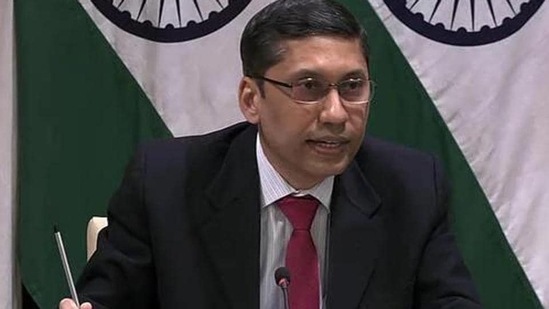
External affairs ministry spokesperson Arindam Bagchi said some of the detained men with families in Doha are being allowed to meet them on a weekly basis. (File Photo/ANI)
By Anum Khan 7 September 2023
In August 2022, global attention was drawn to the apprehension of eight retired Indian Navy officers in the vibrant metropolis of Doha, Qatar. This group of former Indian officers, having transitioned into the private sector, unexpectedly found themselves entangled in an international conundrum that has left observers and policymakers perplexed. As we approach nearly a year since their initial detention, it remains disconcerting that the Qatari authorities have yet to disclose the formal charges against them, thus casting a shadow of uncertainty over their fate.
The officers under scrutiny are Captain Navtej Singh Gill, Captain Birendra Kumar Verma, Captain Saurabh Vasisht, Commander Amit Nagpal, Commander Purnendu Tiwari, Commander Sugunakar Pakala, Commander Sanjeev Gupta, and Sailor Ragesh. Although the precise nature of the charges against them remains undisclosed to the public, circumstantial evidence and reports suggest that these individuals are facing allegations centered on the transmission of sensitive and classified information related to a technologically advanced submarine with stealth capabilities. The intended recipient of this purportedly shared information is indicated to be an external entity, with particular reference to the nation of Israel.
The submarine in question is integral to a substantial project initiated by Qatar in collaboration with an Italian shipbuilding firm. These submarines are characterized as a scaled-down iteration of the U212 Near Future Submarine, a project originating in Italy in partnership with a German counterpart. The U212 submarines are renowned for their advanced technology, notably their utilization of metamaterials to enhance stealth capabilities, rendering them particularly elusive to detection. Significantly, Israel, though yet to officially comment on the matter, maintains a vested interest in curbing the proliferation of advanced military technologies throughout the Middle East. This interest is rooted in concerns that such technological advances might undermine its United States-supported military dominance in the region. Nevertheless, it may be taken as an extension of military power and influence that the United States provides and backs in the Middle East region. United States supports and maintains a strong military presence and strategic alliances with certain countries in the Middle East, which in turn enhances its dominance or control over military affairs and security in that region. This time, its India that is being nominated to perform this duty as witnessed in Middle Eastern Quad or I2U2 partnership.
The detention of these Indian nationals under weighty allegations is a matter of deep apprehension, especially considering their extended incarceration without a clear articulation of the charges levied against them. Furthermore, the prospect of the death penalty looms ominously, intensifying the gravity of their predicament.
Understandably, the Indian government has diligently pursued consular access to the detained officers and has been actively engaged in efforts to secure their release. Regrettably, the Qatari authorities have been reticent in sharing the evidentiary basis allegedly linking these officers to espionage activities. Such opacity not only fosters diplomatic tension but also raises pertinent questions concerning the fairness and transparency of the ensuing legal proceedings. The emotional plea from the sister of one of the detained officers is both poignant and compelling, as she implores the government to intervene and repatriate her brother. Her sibling, a retired Indian Navy commander, had been in Qatar to provide specialized training to the Qatari Navy through his company, Dahra Global Consultancy Services. The anguish and uncertainty that engulf their family underscore the human dimension of this complex situation.
Like East Asia, great power competition for order determination driven by partnerships and alliances is responsible for militarizing the Middle East. A general trend of growing military technology and the interests of various players is evident in the region, including Israel and the United States. Contemporarily, India is emerging as responsible party for Middle Eastern militarization, and a designated stakeholder in the Middle East wherein multiple actors are involved in the pursuit of military capabilities in the Middle East. This situation is further complicated by the backdrop of U.S.-backed military dominance in the region, with the United States historically providing support to regional allies for stability and its own strategic goals. The Middle East’s increasing focus on military technology is compounded by the interests of influential actors like Israel. Israel, a technologically advanced nation with strategic importance, seeks to monitor and limit the spread of such technology among neighboring states, motivated not only by security but also by the aim to maintain its military superiority, often supported by the United States.
Consequently, the pursuit and use of military technology in the Middle East are intertwined with intricate geopolitical factors, national security agendas, and alliances, necessitating careful diplomacy to manage potential conflicts and uphold regional stability.
